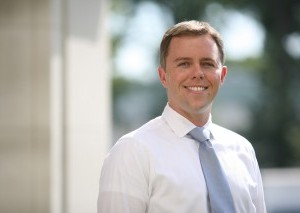Jan 27 2015
John D. Fortner, PhD, the I-CARES Career Development Assistant Professor of energy, environmental & chemical engineering, will study new composite materials for advanced water treatment with a prestigious Faculty Early Career Development Award (CAREER) from the National Science Foundation (NSF).
 John Fortner, PhD. Credit: Washington University in St. Louis
John Fortner, PhD. Credit: Washington University in St. Louis
The five-year, $500,000 award is for his project titled “Development and Application of Crumpled Graphene Oxide-Based Nanocomposites as a Platform Material for Advanced Water Treatment.”
The CAREER awards support junior faculty who model the role of teacher-scholar through outstanding research, excellent education and the integration of education and research within the context of the mission of their organization. Fortner is the 23rd faculty member in the School of Engineering & Applied Science to receive the award.
“John Fortner is an innovative environmental engineer and has capitalized well on strengths in nanomaterial synthesis in the department and come up with path breaking applications in clean water technologies,” says Pratim Biswas, PhD, the Lucy and Stanley Lopata Professor and chair of the Department of Energy, Environmental & Chemical Engineering. “He is a team player and works well with faculty colleagues and students. The award from NSF will further propel him to develop new ideas and innovations in the much-needed area of water quality.”
Fortner plans to develop and engineer 3-D, nanoscale composites made of crumpled graphene oxide as multifunctional, platform materials for advanced water treatment technologies. To date, crumpled graphene oxide nanocomposites have not yet been evaluated for this purpose, despite having highly tailorable properties, including tunable chemistries and scalable production routes.
Along with material synthesis and characterization, he plans to develop and evaluate a range of membrane assemblies for advanced water treatment, including crumpled graphene oxide nanocomposites, which are highly water-permeable, photoreactive and antimicrobial. There is a patent pending for this platform technology.
In addition, Fortner plans an educational outreach program to about 450 area middle- and high-school students, as well as research opportunities for 20-30 undergraduate students and two doctoral students. He is developing a novel water monitoring module for students in local high school advanced placement environmental science classes as well as a mentoring, education and training program for students at the Knowledge is Power Program (KIPP) charter school who participate in science competitions.
Fortner’s research focuses on the environmental implications and applications of advanced materials. He has extensively studied the environmental fate, reactivity and impacts of engineered carbon nanomaterials in aqueous systems. Fortner also is developing nanoscale metal oxide-based materials for environmental sensing and novel, highly efficient water treatment processes.
In 2012, Fortner received the Ralph E. Powe Junior Faculty Enhancement Award from Oak Ridge Associated Universities.
Prior to joining Wash U in 2010, Fortner was a postdoctoral research fellow at Rice University, Georgia Tech and ETH-Zurich. He earned a doctorate from Rice University in 2007 and a bachelor’s degree from Texas A&M University in 2000.
Fortner has previously conducted research funded by the NSF, the Army Corps of Engineers, the American Chemical Society, Washington University’s International Center for Advanced Renewable Energy and Sustainability (I-CARES) and the McDonnell Academy Global Energy and Environment Partnership (MAGEEP).